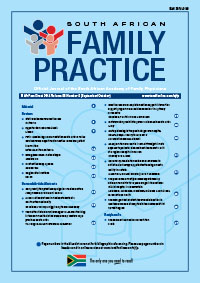Self-efficacy, medication beliefs and adherence to antiretroviral therapy by patients attending a health facility in Pretoria
Keywords:
adherence self-efficacy, beliefs about medicines, antiretroviral therapy adherence
Abstract
Background: Self-efficacy and medication beliefs are known factors that influence adherence to treatment in chronic medical conditions. We carried out a cross-sectional study on human immunodeficiency virus (HIV) -infected patients with the aim of determining the predictive relationship between these two variables and adherence to antiretroviral therapy (ART) at a health facility in Pretoria. Method: Participants’ medication beliefs were assessed using the Beliefs about Medicines Questionnaire. Self-efficacy was evaluated using the HIV Adherence Self-Efficacy Scale, and adherence to ART determined using the AIDS Clinical Trial Group questionnaire. Results: The mean age of the 232 participants was 40 years (standard deviation 15.6). Seventy per cent were females. Most had been on ART for over two years (87%), and 81.5% were adherent to at least 95% of the prescribed antiretroviral drugs. Nonadherence was highest in those on ART for more than three years (63%). The mean HIV Adherence Self-Efficacy score was 6.45 out of a possible 10. Beliefs held by the participants about the importance of (necessity) and concerns about ART in the management of HIV infection were generally positive. There was a mean score of 4.05 out of 5, indicating a strong belief in the use of ART. There was a strong association between adherence self-efficacy and ART adherence (p < 0.001) in the nonadherent participants. Regression analysis showed significance for adherence self-efficacy on ART nonadherence (p < 0.041), with adherence self-efficacy explaining 9.8% of the variance. Conclusion: Patients’ adherence self-efficacy explained a significant portion of variation in the nonadherence to ART, which suggests that low adherence self-efficacy is influential in ART nonadherence. Interventions aimed at improving adherence to ART should address adherence self-efficacy.
Published
2015-01-30
Section
Original Research
By submitting manuscripts to SAFP, authors of original articles are assigning copyright to the South African Academy of Family Physicians. Copyright of review articles are assigned to the Publisher, Medpharm Publications (Pty) Ltd, unless otherwise specified. Authors may use their own work after publication without written permission, provided they acknowledge the original source. Individuals and academic institutions may freely copy and distribute articles published in SAFP for educational and research purposes without obtaining permission.

